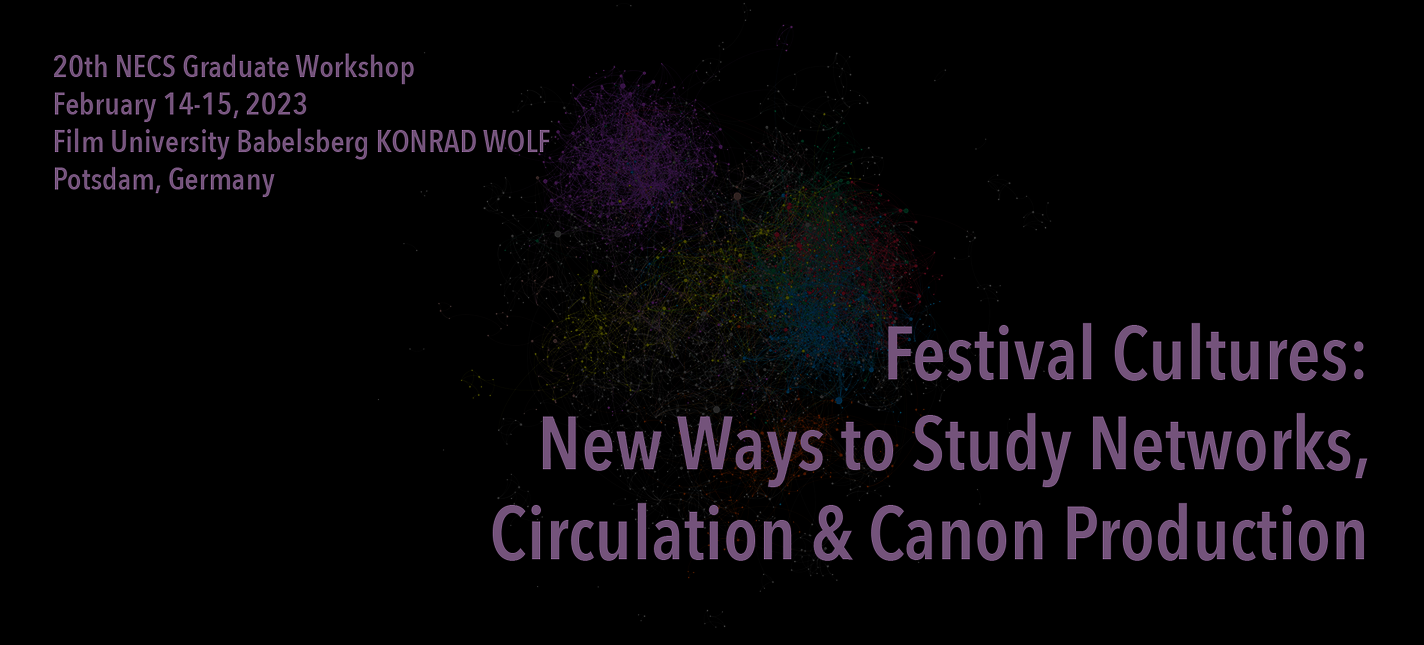Festival Cultures: New Ways to Study Networks, Circulation & Canon Production is hosted by Film University Babelsberg KONRAD WOLF in cooperation with ZeM - Brandenburgisches Zentrum für Medienwissenschaften.
The 20th NECS Graduate Workshop seeks to explore new ways to study film festival networks, the circulation of knowledge, films, experiences, and the production of film canons within those networks. To this end, we consider it necessary to reevaluate different interdisciplinary methodologies and explore new ways to analyze film festivals as an integral part of film cultures. In light of the rapid technological progress, we must ask ourselves not only what is to be gained from these methods, but also what their limits are and how we can make these limits transparent and productive for a fruitful scholarship.
The study of film festivals and film culture at large presents methodological challenges. In recent years, new interdisciplinary methods that go beyond the classic film studies canon have been applied ranging from anthropology to social sciences (Vallejo & Peirano 2017), tourism, urban studies and qualitative analysis. The global history approach, with its focus on tracing back the transnational exchange of knowledge while taking into account hierarchies and power structures marked by Eurocentrism (Conrad 2016), offers tools to decolonise and question the taken-for-grantedness of the historical narratives, film canon included. With a recent turn to digital methods, new quantitative approaches have surfaced, especially relying on Digital Humanities tools for data collection and the visualization of research outputs and datasets, mostly through the mapping of networks and/or circulation of films or actors within the various film festivals networks (Loist 2022; Vanhaelemeesch 2021).
In our two-day workshop we want to mobilize multiple perspectives for the analysis of film festivals, where the following questions will be central for the discussion:
- Which tools can help us analyze larger questions of film and festival culture?
- What methods are needed and/or useful?
- What can data collection, data analysis and a Digital Humanities’ perspective offer?
- Which interactive approaches or results can be used?
- How can one approach oral history in order to understand the ephemeral nature of such events?
- How can we analyze the impact of a film program as a (curated) program beyond the individual films?
- How can the touring of festival programmes and its transfer of knowledge and experience be analyzed?
- How can the global history approach be applied to film festival studies?
Confirmed keynote speaker: Aida Vallejo (University of the Basque Country). Confirmed senior festival studies scholars in attendance: Marijke de Valck (Utrecht University), María Paz Peirano (Universidad de Chile), Skadi Loist (Film University Babelsberg KONRAD WOLF), and Senem Saduruel (Mersin University).
People interested in the workshop are welcome to join the Graduate Workshop taking place in Potsdam, Germany from 14-15 February 2023 as an active audience member and participate in the discussions with us.
There is no conference fee, however, an active NECS membership is required. To become a member, please visit the NECS website: https://necs.org/
Please let us know as soon as possible if you would like to join the workshop. Places are limited and we will proceed with a first come first served policy. Please register with Lucy Pizaña: lucy.pizana(at)filmuniversitaet.de


